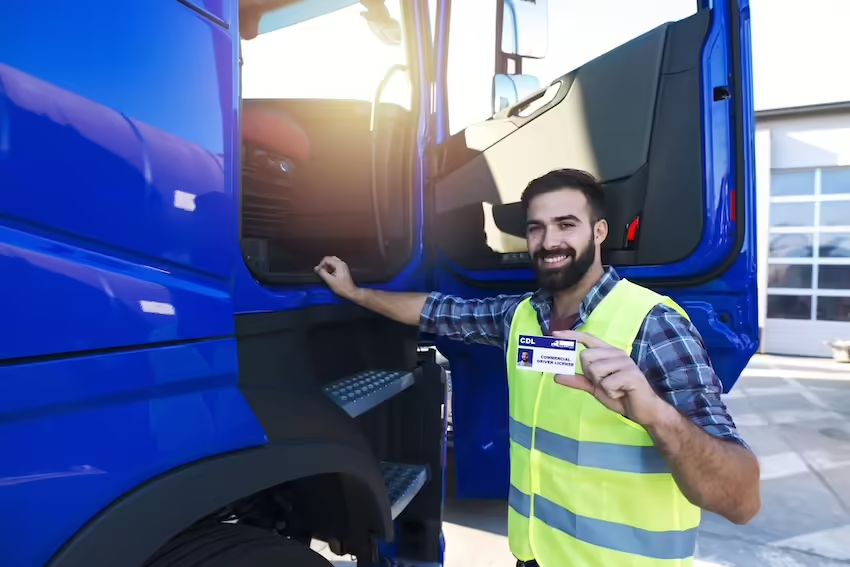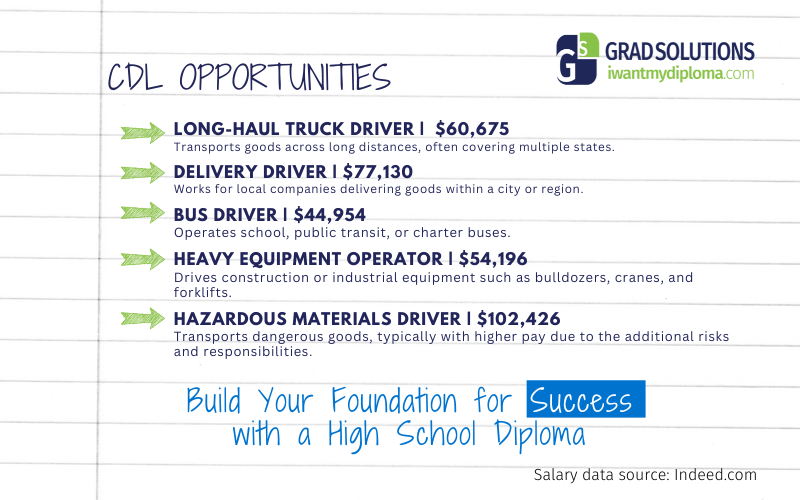Program Information
Do You Need a High School Diploma for a Commercial Driver’s License?

A high school diploma or GED is not always required, but many trucking companies prefer candidates with at least a high school degree as it prepares potential truck drivers for CDL training, written knowledge exams, and future career advancements.
The trucking industry is an essential backbone of the economy, transporting goods across the country and ensuring stores, businesses, and industries remain well-supplied. If you’re considering a career in this vital field, you might wonder if you need a high school diploma to obtain a Commercial Driver’s License (CDL).
Several factors associated with completing your high school education can influence your career in trucking and beyond. Here, we will explore the differences between a Commercial Driver’s License and a Regular Driver’s License, CDL requirements, career opportunities with a CDL, and other reasons to earn a high school diploma.

Commercial Driver’s License vs. Regular Driver’s License
A Commercial Driver’s License (CDL) differs significantly from a regular driver’s license. While a regular driver’s license allows you to operate standard passenger vehicles, a CDL must operate large, heavy, or placarded hazardous material vehicles. There are three classes of CDLs:
- Class A: For drivers of combination vehicles with a gross combination weight rating (GCWR) of 26,001 pounds or more, provided the vehicle is over 10,000 pounds.
- Class B: For drivers of single vehicles with a GVWR of 26,001 pounds or more or any such vehicle towing another not exceeding 10,000 pounds.
- Class C: For drivers of vehicles designed to transport 16 or more passengers (including the driver) or carrying hazardous materials.
CDL license holders in the United States often operate semi-trucks, tractor-trailer drivers, buses, and other large vehicles requiring more skill and responsibility than driving a car or light truck. The roles and responsibilities of a commercial truck driver are varied but essential for ensuring the efficient transportation of goods. Here is a list of the essential duties:
Driving and Navigation
- Operating Commercial Motor Vehicles: Safely operate heavy trucks and tractor-trailers to transport goods to various destinations.
- Route Planning: Plan and follow efficient routes using maps and GPS systems to avoid traffic and minimize travel time.
- Compliance with Federal Regulations: Adhere to federal and state laws, including hours-of-service regulations and weight limits.
Safety and Maintenance
- Vehicle Inspection: Conduct pre-trip and post-trip inspections to ensure the vehicle is in good working condition.
- Essential Maintenance: Perform basic maintenance tasks such as checking tire pressure, oil, and other fluid levels.
Documentation and Reporting
- Logbooks: Maintain accurate records of hours worked, miles driven, and rest periods as required by law.
- Incident Reporting: Report accidents, mechanical issues, or traffic violations to the appropriate authorities.
Customer Service
- Delivery and Pickup: Deliver goods to customers on time and in good condition, following any special instructions for delivery.
- Customer Interaction: Excellent customer service, addressing any concerns or issues during delivery.
Cargo Management
- Loading and Unloading: Assist with loading and unloading cargo, ensuring it is properly secured and balanced.
- Cargo Checks: Regularly check cargo to ensure it is safe and undamaged during transit.
Professional Development
- Continuous Learning: Stay updated on transportation industry regulations, new technologies, and best practices in professional truck driving.
- Licensing and Certification: Maintain a valid Commercial Driver’s License (CDL) and other required endorsements, such as HazMat endorsement, if applicable.
In summary, professional driver duties are similar to a pilot’s; they must do a pre-flight check to ensure that equipment is well-maintained and running effectively. These roles and responsibilities ensure that commercial truck drivers can transport goods safely, efficiently, and in compliance with all relevant regulations.

Understanding CDL Requirements
Becoming a truck driver involves more than obtaining a Commercial Driver’s License (CDL) and hitting the road. There are several lesser-known requirements and considerations that aspiring truck drivers should be aware of to ensure they are fully prepared for the job’s demands.
Basic Requirements
To obtain a CDL, you must meet several requirements which vary slightly by state but generally include the following:
- Age: You must be at least 18 years of age to drive intrastate (within the same state) and 21 years of age for interstate driving (between states) or to transport hazardous materials.
- Residency: You must have a valid driver’s license and provide proof of residency.
- Physical Examination: You must submit a Department of Transportation (DOT) medical card that meets the physical requirements and health standards necessary to drive a commercial vehicle.
- Knowledge and Skills Tests: You must pass a knowledge test and a skills test, which includes a pre-trip inspection, basic control skills, and an on-road driving test.
- Background Check: The Transportation Security Administration (TSA) requires a background check for specific endorsements, such as hazardous material endorsement.
Other Requirements
For more specialized commercial transport loads, you may need additional endorsements and special certifications. For example, a Hazardous Materials (HazMat) Endorsement is required for transporting hazardous materials, which includes additional background checks and a separate knowledge test.
Commercial truck drivers must comply with Hours of Service (HOS) regulations and submit to vehicle inspections. These HOS rules specify the number and length of rest periods, to help ensure that drivers stay awake and alert.
Education Requirements
You must complete a CDL training course from a professional school. This applies to all new CDL applicants beginning February 7, 2022. They must receive training from a certified organization on the national Entry-Level Driver Training (ELDT) providers registry. Although a high school diploma is not a direct requirement for obtaining a CDL, commercial truck driving schools require that student applicants possess a high school diploma or a recognized equivalent like a GED. This ensures the student can successfully complete the program.

Career Opportunities with a CDL
A CDL opens many career opportunities beyond just driving a truck. Here are some career paths available to CDL holders in Arizona:
- Bus Driver – $44,954 average annual salary in Arizona: operates school, public transit, or charter buses.
- Long-Haul Truck Driver – $60,675 average annual salary in Arizona: transports goods across long distances, often covering multiple states.
- Delivery Truck Driver – $77,130 average annual salary in Arizona: works for local companies delivering goods within a city or region.
- Heavy Equipment Operator – $54,196 average annual salary in Arizona: drives construction or industrial equipment such as bulldozers, cranes, and forklifts.
- Hazardous Materials Driver – $102,426 average annual salary in Arizona: transports dangerous goods, typically with higher pay due to the additional risks of unforeseen circumstances and responsibilities.
These roles provide stable employment and opportunities for career advancement, often without the need for a four-year college degree.
Commercial Truck Driving Schools
One of the key benefits of earning a high school diploma is meeting the educational requirements set by many commercial truck-driving schools. These schools require students to have a high school diploma or equivalent as a prerequisite for enrollment. This requirement ensures students have a solid educational foundation for understanding the complex regulations, safety procedures, and technical knowledge needed in the trucking industry. By obtaining a diploma through Grad Solutions, aspiring drivers can access these specialized training programs, gaining the skills and certifications necessary to excel in their careers.

Other Reasons to Earn a High School Diploma
Even though a high school diploma is not required for obtaining a CDL, there are several compelling reasons to complete your high school education:
- Broader Job Opportunities: Many employers prefer or require a high school diploma for hiring, even for positions that do not strictly require one.
- Higher Earning Potential: Statistics consistently show that individuals with a high school diploma tend to earn more over their lifetime than those without one.
- Personal Development: Completing high school provides essential skills in reading, writing, math, and problem-solving, which are valuable in any job.
- Learning a Trade: A high school diploma is a prerequisite for pursuing post-high school education, including other trades and vocations.
- Career Flexibility: A diploma can make it easier to switch careers or advance within your current field, offering greater flexibility and stability outside of truck driver training.

Earn Your Diploma with Grad Solutions and Launch Your Driving Career
Earning a high school diploma is a significant milestone that can open doors to numerous career opportunities, including those in the commercial trucking industry. For aspiring truck drivers, obtaining a high school diploma through a program like Grad Solutions is a pivotal step toward a rewarding career on the road. Grad Solutions offers flexible, online, supportive pathways for individuals to complete their high school education, providing them with the essential credentials to pursue advanced training and professional opportunities.
A high school diploma enhances a candidate’s employability in the competitive job market. Employers view a high school diploma as a sign that a candidate possesses essential skills such as critical thinking, problem-solving, and effective communication.
High school graduates are better equipped to pursue additional endorsements and specialized certifications within the trucking industry. Earning a high school diploma with Grad Solutions can be the launchpad for a successful and fulfilling career in commercial truck driving.
The trucking industry offers numerous opportunities for those with a CDL, but completing your high school education ensures you have the foundation to seize these opportunities and excel in a competitive job market. Whether you drive long-haul trucks, operate buses, or explore other avenues within the transportation sector, a high school diploma can be a valuable asset in your professional journey.
Contact us for more information about returning to earn your high school degree, or enroll online today!
Resources
Commercial Driver License (CDL)
Differences Between CDL vs. Non-CDL Driver’s Licenses
Long haul driver salary in Arizona
Delivery driver salary in Arizona
Equipment operator salary in Arizona
CDL A (HazMat) Truck driver salary in Arizona